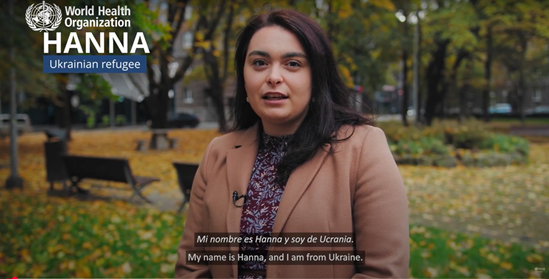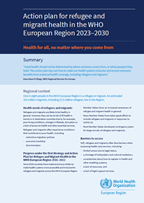
World Refugee Day 2025: in solidarity with refugees and their right to health
World Refugee Day 2025: in solidarity with refugees and their right to health
Health for one, health for all
On World Refugee Day, WHO joins the United Nations High Commissioner for Refugees (UNHCR) and partners in standing in solidarity with refugees – people who have been forced to flee their homes due to conflict, persecution or crisis. In 2025 we reaffirm our collective commitment to ensuring their right to health.
Refugees are not separate from us. Our commitment to refugee health reflects our values, and is a testament to equity, dignity and shared humanity.
Healthy societies leave no one behind. Not in law. Not in everyday life. Not in health.
The numbers behind the crisis
At the end of 2024, 122.6 million people were forcibly displaced worldwide – an increase of over 5 million compared to the year before. In the WHO European Region alone, 13.2 million refugees have fled conflict, persecution and climate-related disasters.
Globally, 87% of forcibly displaced people live in low- and middle-income countries, many with fragile health systems. This is more than a refugee crisis; it is a global health crisis that demands collective action.
Health in exile: a hidden emergency
Refugees face unique and compounding health challenges:
- disrupted access to care
- exacerbated chronic illnesses
- elevated mental health needs
- discrimination and isolation
- poor living and working conditions
- linguistic and cultural barriers to services.
Often, health systems are not built to move with people. As refugees cross borders, their health rights can vanish. This is unacceptable. Health is a human right, regardless of race, religion, age, nationality or sex.
Climate change, conflict and displacement: a triple threat
From floods to droughts, climate change is displacing people or trapping them in vulnerable areas. Environmental shocks are uprooting communities across the globe.
When people are displaced, their health is displaced too. Yet, responses remain reactive and fragmented. This is not just an environmental crisis – it’s a human crisis and a health crisis. We must protect health before, during and after displacement.
Solutions in action: WHO’s work across the Region
In October 2023 WHO/Europe launched the Action Plan for Refugee and Migrant Health in the WHO European Region 2023–2030, grounded in the principle of leaving no one behind. It defines 5 strategic pillars:
- Ensure universal health coverage includes refugees and migrants.
- Implement inclusive emergency and disaster risk-reduction policies.
- Create health-promoting environments that foster inclusion.
- Strengthen migration health governance and evidence-based policy-making.
- Foster innovative partnerships to address evolving needs.
Progress is being tracked. The first evaluation will be presented at the WHO Regional Committee for Europe in October 2025.
Health as a path to inclusion
Refugees bring skills, resilience and cultural enrichment. When we safeguard their well-being, we unlock their full potential and strengthen our communities in return.
Access to health care must be continuous, timely, culturally responsive and inclusive. Health workers who are trained to understand diverse needs are at the heart of building resilient, people-centred systems.
Collaborating for change
WHO supports countries in transforming health systems to:
- integrate refugee and migrant health in primary care
- address social determinants including income, education and housing
- empower displaced individuals to manage their health.
WHO also leads the Global Research Agenda on Health, Migration and Displacement, aligning research with real-world policy and action.
In partnership with the International Organization for Migration (IOM) and the European Union, WHO is also supporting 10 countries hosting refugees from Ukraine through a project aimed at improving access to care for those under temporary protection. This initiative, funded by the EU4Health work programme, runs until the end of 2025.
This World Refugee Day, we call for:
- policies based on evidence
- partnerships grounded in trust
- health systems that move with people
- a commitment to health as a foundation for hope and inclusion.
Together, let’s build systems where health knows no borders.
Multimedia






